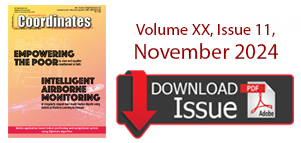| Galileo Update | |
Galileo Update
|
||||||||||
The best application idea for EGNOS
Since its certification for use in managing air traffic and other securitycritical applications in 2011, EGNOS – Europe’s augmentation system for GPS – now enables new applications for precise and reliable satellite navigation. To promote EGNOS, the European GNSS Agency (GSA) is offering a special prize for the most promising idea using the system. The prize is part of this year’s European Satellite Navigation Competition (ESNC). The winner will receive the support they need to realise their project at a European incubation centre.
www.galileo-masters.eu
Next Galileo satellites to launch after the summer
The European Commission has announced the launch date of the next pair of ESA-procured Galileo satellites. These will be launched together on a Soyuz from French Guiana on 28 September, joining the two satellites already in orbit. Antonio Tajani, Vice President of the European Commission, responsible for industry and entrepreneurship, announced the launch on 2 May in Brussels, together with Jean Yves Le Gall, Chairman and CEO of Arianespace, in the presence of industrial leaders involved in the programme, and in agreement with ESA’s Director of the Galileo Program and Navigation-related Activities Didier Faivre. The new launch will take place within a year of the first two Galileo In-Orbit Validation satellites, which reached orbit on 21 October 2011. Four navigation satellites are the minimum needed for satellite navigation – to measure latitude, longitude and altitude while checking ranging accuracy – so these four Galileo satellites can be used to assess the performance of Galileo’s world-spanning ground system that serves to maintain the precision of the Galileo system.
www.spacedaily.com
GNSS Agency moves to Prague
The lower chamber of the Czech Parliament announced, on 3 May, that it has given the green light to the transfer to Prague of the administrative headquarters of the agency in charge of managing Galileo. The agency will move to Prague during the summer. The European Global Navigation Satellite System (GNSS) Agency is the first EU regulatory body to move its headquarters to the Czech Republic, after having been provisionally located in Brussels.
http://www.europolitics.info
Astrium built Galileo satellites fit and fully operational
The first two Galileo In-Orbit Validation (IOV) satellites built by Astrium, Europe’s leading space company, are working perfectly and now begin full in-orbit operations.
The satellites successfully passed a series of in-orbit tests following their launch on the first Soyuz flight from the Guiana Space Centre, French Guiana on 21 October 2011.
The satellites now fully qualified in orbit are the first two of four IOV satellites developed by Astrium for the Galileo system.
http://www.spacedaily.com











 (No Ratings Yet)
(No Ratings Yet)





Leave your response!